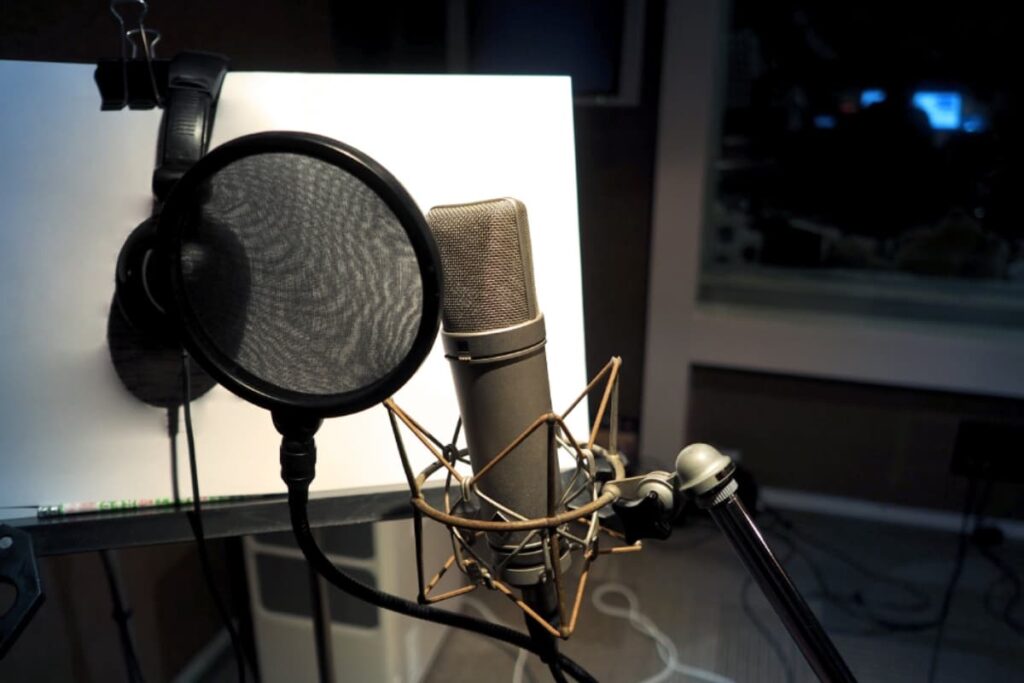As an aspiring home studio audio engineer, you will face many different options when choosing a microphone for your home studio.
Most microphones fall either into the category of condenser or dynamic mics and condenser mics often get way more praise than their dynamic counterparts, which may make you wonder if they really sound better.
However, the answer is not always straightforward, and we have to be nuanced when discussing this.
Condenser mics don’t always sound better. They are the perfect choice for recording vocals in a studio due to their sensitivity but are not the best choice for recording instruments or singing live. A dynamic microphone would be a better choice for those tasks.

Table of Contents
- What Is a Condenser Microphone?
- When Does a Condenser Microphone Sound Better?
- Dynamic Mics: When Is a Condenser Microphone Not the Best Option
- The Cons of a Condenser Microphone
- Final Thoughts on Condenser Mics
In this article, we’ll take a detailed look into condenser mics to examine what they are good for and not so good for. At the end of the article, you’ll know exactly what type of microphone to use for what job.
What Is a Condenser Microphone?
Condenser microphones are microphones that rely on two capacitor plates to produce sounds. One capacitor plate is a thin membrane moving relative to the other. This changes the capacitance and converts sound waves into electrical signals.
Condenser Microphones
Condenser mics are sometimes dubbed capacitor microphones.
This is because they rely on a capacitor to convert sound waves into electrical energy. This capacitor consists of two metal discs—the closer their proximity, the better the overall performance of the microphone.
The first of the two capacitor plates is a thin conductive membrane (diaphragm) usually made of gold-sputtered mylar, or in some cases, very thin metal, but the latter is rare today.
When you speak or sing into a condenser microphone, the membrane moves to the rhythm to and from the second capacitor plate, which is sturdy and doesn’t move.
As the membrane moves, the capacitance changes, and the sound is converted to an electric signal. This mic signal is transferred to your audio interface or computer for further processing.
Phantom Power
Since these condenser mics are not super powerful, they require something called phantom power to work, which is standard nowadays.
When Does a Condenser Microphone Sound Better?
Condenser microphones sound better when recording vocals. Its sensitivity will allow it to capture more details than a dynamic microphone, producing a better-recorded voice sound. This includes both spoken material, podcasts, and music vocals.
Condenser Mics
Since the front plate of the condenser microphone is very flexible, it allows the microphone to capture your human voice sounds in great detail, which makes your own voice sound better and equals a better sound quality.
When you record sound, the greater detail also allows you to spot mistakes and imperfections in the audio quality, further improving it during the production and editing processes.
Does a Condenser Mic make you Sound Better?
The flexibility of the front plate also means that the microphone can capture a wider variety of frequencies compared to a dynamic microphone.
This will allow you to record the sound of both low and high frequencies pretty well, without noise, humming, or buzzing. This will give you an overall cleaner sound.
Thus, it is an ideal option for recording vocals. It is great for singing in the studio, where you want as much detail as possible on the recording.
Moreover, it’s a great tool for podcasts, streams, and similar types of content where you have to speak to your audience.
Dynamic Mics: When Is a Condenser Microphone Not the Best Option
Condenser microphones may not be the wisest choice of microphones for recording instruments and playing live. This is because they are fragile and don’t withstand loud sound really well. In these situations, it’s better to use a dynamic microphone.
A condenser mic may not be best if you want mike amps and drums, and you’ll instead want to use dynamic mics.
Dynamic Microphones
You can do it, definitely, but you would probably get better results using a dynamic microphone instead. Amps and drums tend to make very loud sounds, which does not usually sit well with the high sensitivity of most condenser mics.
A dynamic mic would also be the better choice in a live performance setting.
Dynamic mics tend to be sturdier and more durable, which is preferable during a live performance, especially if it’s a music genre that causes rowdiness in the audience.
In that case, you’ll need something cheap to replace and not easily breakable, like a dynamic mic.
The lower sensitivity of a dynamic microphone may be an upside in this case because a dynamic mic is less likely to pick up the sound waves of the audience and muddy the sound of your band.
A rule of thumb is that wherever there is a lot of background noise, it’s better to opt for a dynamic mic.
The Cons of a Condenser Microphone
We can see that condenser mics have some really big advantages over dynamic microphones and have many features that make them really useful pieces of gear.
However, they are not ideal, just like any piece of gear, and have a couple of downsides. Let’s examine them.
- They are costly: Since these microphones are a pretty sophisticated piece of equipment, they tend to cost more than dynamic microphones. While their prices may range widely, a great condenser mic will cost more than a great dynamic mic.
- They are fragile: The front capacitor plate inside a condenser mic is super delicate, which makes the whole mic very delicate. You need to handle them with great care and mic placement, so they don’t break easily, especially since they are so expensive to replace.
- They pick up background noise: The sensitivity of this microphone is generally a great advantage, but it can also be a con. When you record audio, they will pick up sound waves indiscriminately, often picking up random noise in the background and potentially ruining the recording quality. For that reason, it’s best to use them in a room that is soundproofed really well.
Final Thoughts on Condenser Mics
Condenser mics sound better when it comes to recording vocals.
They’re the best choice for that job. They don’t do a good job performing live or recording instruments compared to dynamic microphones because they are too sensitive and delicate for that.
- Review of the ALABS IRON MINI-WL: A Powerhouse Wireless Microphone - October 4, 2023
- What is a Saturator in Music Production: A Brief Explanation - May 11, 2023
- What Are Rotary DJ Mixers? An Overview - May 11, 2023
SoundStudiomagic.com is a participant in the Amazon Services LLC Associates Program, an affiliate advertising program designed to provide a means for sites to earn advertising fees by advertising and linking to Amazon.com. We also participate in other affiliate programs which compensate us for referring traffic.

